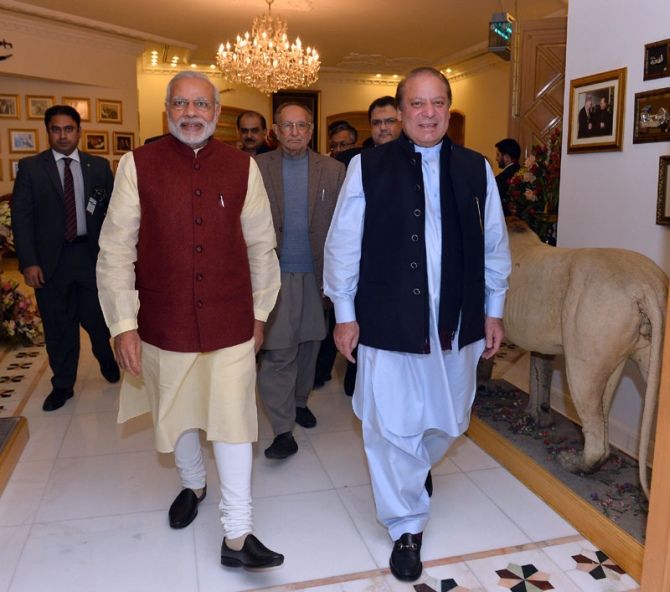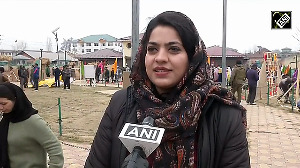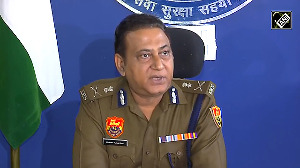
'We cannot forget that Pakistan is a criminal State, it is a rogue State and yet we want oil pipelines to go through their State, we want to have people-to-people contact, want to increase trade with them.'
'When Modi was prime minister-elect, he said there can be no dialogue in the face of bombs and bullets. After becoming prime minister, he is saying talks will continue. Was he then misleading the public then or is he misleading the public now?'
'Nobody goes around abusing China. The fact is China is a great power. I do not think India is a great power. People spit on our face and we still go grovelling before them.'
Counter-terrorism expert Dr Ajai Sahni believes that holding talks with Pakistan will hold no purpose unless Islamabad changes its attitude to terrorism. Dr Sahni spoke about the repercussions of the terror attacks on the Pathankot airbase with Rediff.com contributor Rashme Sehgal.
What is the attack on the Pathankot airbase indicative of?
There is once again a very comprehensive failure of understanding as far as managing conflict and building peace is concerned.
We will always escalate and widen conflict if it is not reality-based.
One example of this was when the Allied powers sought to appease Adolf Hitler, tried to accommodate him, to understand him -- and this became the very basis for the eventual carnage that consumed practically the entire world.
This is a repetition of the same situation. We are trying to create peace without understanding the capacities of our adversary. We have shown that talks and terrorism can go hand in hand because even when the incident (the attack on the airbase was going on) was ongoing, we had senior government functionaries indicate that secretary-level talks will go on and that we will make terrorism the centre of these talks, that we will use this opportunity to provide evidence to Pakistan of this attack.
As though this action in Pathankot was something out of the blue, as though the cumulative evidence provided to them in the last 30 years had seen them change, as though the intentional perpetrators of this crime would now agree to punish themselves, as though the world was going to change their attitude with the presentation of this evidence.
After all, what is the basic presumption of our peace process?
Our presumption is based on a wrong premise. Pakistan knows full well that it can go on talking and present itself to the world as being a reasonable power which it is not.
If we want to live with our head in the clouds, we are likely to fall down hard.
There is a real threat of Islamic terrorism in which Pakistan, Saudi Arabia and other countries are involved. The stand that one man's terrorism is another man's friend is frightening as we have witnessed in Syria.
The attacks on Paris brought home the reality of terrorism in the West. But look how France responded, when Paris was attacked.
When people die in India, it is not something that concerns the West. We in India (unlike France) have not gone around banning the burqa, we are not disallowing people from saying their prayers. Syria and Iraq are two examples of Islamic terrorism, then why not India.
India has been under international pressure to hold talks with Pakistan.
The world wants us to talk on terrorism without having received any assurances. When you do this, you confer legitimacy to their actions, you are also conferring legitimacy to them before the world.
We cannot forget that Pakistan is a criminal State, it is a rogue State and yet we want oil pipelines to go through their State, we want to have people-to-people contact, want to increase trade with them.
You cannot forget that civil society in Pakistan is also at the receiving end of terrorist attacks?./strong>
How can we forget that their (Pakistan's) own State is supporting these terrorists? The terrorists have been created by their own government and have now turned against them.
India does not send terrorists to Pakistan, but they are sending terrorists to India. There is no comparison between the two countries.
If they are facing a backlash of terrorism, then this is something they have to deal with.
But it is our stupidity that allows this situation to continue. We are stupid to accept every argument that they place before us. But if we want to continue to live in a make believe world, the world will fall down, that is the truth, that is the reality.
Are you saying there is no space for negotiations with Pakistan?
There is space for negotiations. All space changes when the intentions (of the neighbouring State) change. But have these changed?
When Narendra Modi was prime minister-elect he said there can be no dialogue in the face of bombs and bullets. When after becoming prime minister, he is saying talks will continue. Was he then misleading the public then or is he misleading the public now?
These two positions cannot be reconciled. Some degree of consistency has to be necessary for an action to be described as policy.
Has this policy changed under pressure from the US?
I don't want to get into that speculation. Why he has done so is something which he has to answer for.
The question is that he stopped secretary-level talks because the Hurriyat were talking to the Pakistan high commissioner. But there have been numerous attacks after that. There has been the attack on Gurdaspur. These attacks have been a much greater offence than a meeting of the Hurriyat (with the high commissioner).
It has resulted in the death of our soldiers and our people and yet he is now saying that talks must continue. How does he explain that?
Is this a clear break from the policy having been pursued by the Congress?
Not at all. It is the other way around. The policy being pursued today is precisely the (same) as the policy pursued earlier by the Congress keeping in mind the bureaucratic interests perpetuated by the ministry of external affairs.
Therefore, despite Modi's commitment, I see a transformation in his position on counter-terrorism. I therefore only see this as weakness, I see this as someone who does not know his own mind.
But isn't this a continuation of the (Atal Bihari) Vajpayee position?
Please read the BJP's (Bharatiya Janata Party) election manifesto of 2014 and see what they have written regarding the issue of internal security, of zero tolerance on terrorism. This was Modi's stand and it was drafted by Ajit Doval (the national security advisor). They are doing the opposite of their earlier stand.
I don't want to speculate on what their motives are or whether they are under international pressure now. This is a question of leadership.
One can also ask why the US is not exerting pressure on Pakistan to end terrorism. If a small, third rate, collapsing country can stand up to the US, then why should India, which sees itself as a great emerging power, kneel before every US secretary of state who visits India>?
Where is our national pride? Why is there no evidence of this?
Is there an attempt being made by Western powers to offload the burden of fighting terrorism onto us?
There are multiple patterns at stake here and no country today has the strategic vision to combat terrorism.
The West may possess technological superiority, but it does not have the will or the character to fight terrorism. They would certainly offload the fighting on us and be delighted to drag us into this conflict.
After all, we have been witness to the most irresponsible adventurism by third rate politicians ruling the West in Syria, Iraq and the Middle East who are following a policy without any remorse or accountability, but India must be accountable for everything they do.
We are forgetting that the West is the greatest burden on this world in terms of the destruction of natural resources and everything else without being answerable to anyone.
Therefore, it is imperative to alter the equation of power before the prime minister decides to have tea with Nawaz Sharif and in order to change the dynamics of power between India and Pakistan, the logic of States has to be given primacy.
The problem is that we do not want to understand the issues at stake because we do not want to look at hard solutions because hard solutions are difficult to make. The rest is all garbage.
Modi inviting Sharif to India or going to Pakistan -- these are not reality based because the reality is that if Sharif were to go against the army and the establishment, they would steamroll him.
We cannot forget that Sharif is the father of the Taliban. He was there when the Mumbai blasts occurred. The Lashkar-e-Tayiba and the Jamaat-ud-Dawa are his creation. We can bury our heads and not look at reality, which is why we are always in a mess.
If you don't have a strategy, then you will end up becoming a part of someone else's strategy.
You seem to overlook the fact that Pakistan has nuclear weapons.
How come one does not hear people say India has nuclear weapons? If they were in a position to overrun us, they would have done so a long time ago. It is ridiculous to try and impose rationality on an irrational power and if this has to be done, it can be done so only by the projection of power.
In order to do so, we do not have to go to war. We seem to forget that they are a bankrupt State, they are nothing, they are beneath contempt. They receive some little recognition from the world by indulging in this barbaric behaviour.
They have no potential whatsoever to become a great power. Pakistan can only be less than what they are, never more.
Are you implying we should be akin to China?
Nobody goes around abusing China. The fact is China is a great power. I do not think India is a great power.
People spit on our face and we still come grovelling before them. We have no self respect. We are contemptible. We are constantly giving alibis to Pakistan and its army, its Inter Services Intelligence, Nawaz Sharif and its non-State actors who are criminals.
They have Dawood Ibrahim sitting on the head of Pakistan for the last 22 years. They are protecting this mass murderer with the whole world watching and yet their government has the gall to tell us they do not know where he is.
(Minister of External Affairs) Sushma Swaraj should make it clear that India does not deal with individuals, it deals with States. Pakistan is answerable for its deeds, not Sharif, or any other Sharif loitering around in their country.
- 'Not a terrorist attack, but an attack on India's sovereignty'
- How to defend an air base from terrorists
- Security forces didn't want more casualties
- Why the Pathankot op has gone on for so long
- Doval's actions saved critical air assets in Pathankot
- 'With Pakistan, where is the question of trust?'
- The 3-fold moral of the story in engaging with Pakistan
- Our inward policy has cost us dearly
- How do we face future terror onslaughts?
- 'Very serious risk of a spectacular terrorist attack by ISI-backed groups'
- India-Pak talks: The time for realism is now!
- Pathankot attack: 'Someone' is unhappy with Modi-Nawaz talks
- Pathankot: India's response has to be measured
- 'Modi will continue the engagement with Pakistan'
- Preventing another Pathankot: A soldier's solution
- Pakistan will continue to support terrorists
- 'Terrorists are targeting security establishments'











 © 2025
© 2025